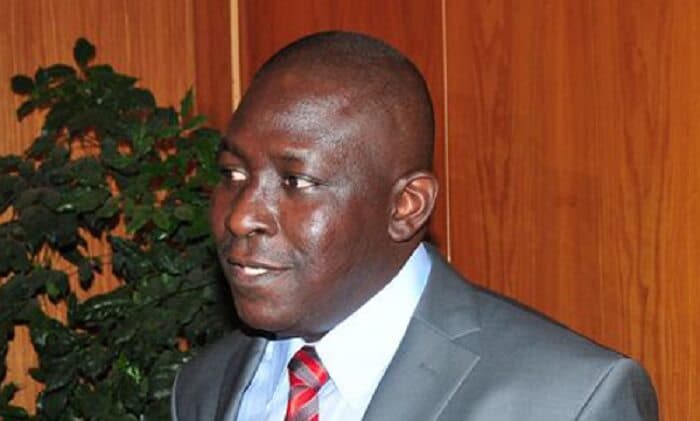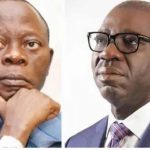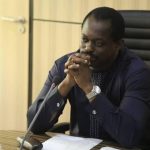...To get all news updates, Join our WhatsApp Group (Click Here)
Also Join our WhatsApp Channel (Click Here)
A former managing director of the Federal Mortgage Bank of Nigeria, and ex son in law to President Muhammadu Buhari, Mr Gimba Yau Kumo is angry with the Independent Corrupt Practices and Other
Related Offences Commission (ICPC) for publicly declaring him wanted in connection to the $65 million fraud allegedly committed during his time as the helmsman at the bank.
In a letter he wrote to the ICPC chairman, dated 27th of May, 2021 and titled, RE: INVESTIGATION ACTIVITIES SIXTY FIVE MILLION UNITED STATE DOLLARS ($65,000,000.00) GOODLUCK JONATHAN LEGACY ESTATE LOCATED IN KUBWA DISTRICT, ABUJA, Mr. Kumo said publicly declaring him wanted has made him to become a common criminal in his own country in spite of having given his best as a public servant.
He claimed that he was never served with any letter of invitation before his name was published or declared wanted in the national dailies and social media which is contrary to Section 29, 30, 31 and 32 of the ICPC Act, 2000 and other enabling laws.
Pointblanknews.com had reported that Kumo, a son-in-law of President Buhari, and two others including Tarry Rufus and Bola Ogunsola were declared wanted over alleged misappropriation of $65 million National Housing Funds.
Mr Kumo, a former managing director of the Federal Mortgage Bank of Nigeria, had in 2016 married Fatima, the president’s daughter, in Daura, Katsina State.
In the notice signed by its spokesperson Azuka Ogugua, the ICPC urged the public to provide information about the whereabouts of the wanted persons.“The persons whose pictures appear above, Mr Tarry Rufus, Mr Gimba Yau Kumo and Mr. Bola Ogunsola, are hereby declared WANTED by the Independent Corrupt Practices and Other Related Offences Commission (ICPC) in connection with issues bordering on misappropriation of National Housing Funds and diversion of the sum of Sixty Five Million dollars ($65,000,000).
“Anyone who has useful information on their whereabouts should report to ICPC Headquarters Abuja, any of the ICPC State Offices or the nearest police station.”
Kumo is yet to honour this invitation. He is insisting that until ICPC formally send an invite, he would not hand over himself.
He has however acquitted hiself of any wrongdoing insisting that the ICPC should rather investigate the management after him whom he claimed “lacked capacity, political will and focus, hence the project was intentionally stalled and Nigerians were denied this laudable opportunities and privilege.”
According to the memo he wrote to ICPC which POINTBLANK NEWS has a copy, he said his ordeal started when the senate committee on public accounts had in April summoned him to explain the alleged irregular award of N3 billion contract when he was still at the bank.
The committee issued the summons following a query raised in a 2015-2018 report by the office of the auditor-general of the federation (AuGF) against the FMBN. According to the report, the contract was awarded in four phases and was overpaid to the tune of N3,045,391,531.97.
But in his response to the allegation, Mr Kumo said the project was started under his management team and was handed over to the new management on the 14th February, 2016 as a result of their disengagement by the Government and that while they were in charge of the project, they followed the procedures alongside the technical partners.
He response to the allegation is replicated below:
The concept and initiative on the above Estate (FMBN Legacy Estate) was a presidential initiative/directives vide Mr. Presidents letter with reference No. SH/COS/92/1/232 dated 28th August 2012, copy attached (marked as APPENDIX 1) for your ease of reference please.
The concept and initiative on the above Estate (FMBN Legacy Estate) was a presidential initiative/directives vide Mr. Presidents letter with reference No. SH/COS/92/1/232 dated 28th August 2012, copy attached (marked as APPENDIX 1) for your ease of reference please.
The letter was conveyed to the Federal Mortgage Bank of Nigeria (FMBN) vide the Honourable Minister of land and Urban development letter with reference No. PS/FMLHVD/X/HD/05/111 dated 10th September, 2012, copy attached and marked as (APPENDIX 2) for your ease of reference please.
Following the above directives, the bank sought and obtained for permission to source for funds and obtained loan both locally and internationally from the Honourable Minister of land, housing and urban development vide our letter dated 21st February 2012, copy attached and marked as (APPENDIX 3) and approval to obtain loan from Ecobank with reference No. FMBN/MD/CE/12.2010/0106 dated 30th July, 2012 copy attached and marked (APPENDIX 4) for your ease of reference please.
HOW WE COME TO KNOW GOOD EARTH POWER LTD
Good earth power Ltd was introduced to us by Mr. Tarry Rufus MD/CEO of T-Brend Fortunes Ltd/Good Earth Power Nigeria Limited with whom the Bank had previous dealings.
Good earth power Ltd was introduced to us by Mr. Tarry Rufus MD/CEO of T-Brend Fortunes Ltd/Good Earth Power Nigeria Limited with whom the Bank had previous dealings.
In the bank quest to partner with foreign investors to deliver affordable housing to Nigerians, Mr. Tarry Rufus who happens to be the local Director of Good Earth Power Nigeria Ltd introduced the company to the Bank for the purpose of partnership to bring construction of modern, integrated and affordable housing to the Nigerian community in line with international best practices and housing being built in other developed countries across the globe.
The above is in line with the presidential directives to the bank to seek cheap private funding delivery in Nigeria. In this direction, the Bank sought for housing project finance facility in the tune of (N10, 000, 000. 00) Ten Billion Naira only)
This project is the first part (Phase 1) of an overall strategy aimed at delivery about 1,000,000 housing units with associated infrastructure (road, power, water, sewage and communication) in Abuja, Lagos, Port Harcourt (and other capital cities in Nigeria).
While FMBN is to source for funding for Phase 1 of the Project (which would comprise 1,550 houses) GEPN is to finance and build the remaining housing units after the first phase, with FMBN providing guaranteed off-takers through facilitating mortgages for each community of houses built in accordance with the terms in the Framework Agreement. Copy of the framework agreement is attached and marked as (APPENDIX 5) and also general affordable housing agreement copy attached and marked as (APPENDIX 6).
THE PROJECT
The FMBN (Goodluck Ebele Jonathan Legacy Estate) is a Model Housing Estate Development located on Plot 4 & 5, Cadastral Zone D12, Kaba District, FCT Abuja. The development is designed to deliver all the services of a modern urban sitting. Including eight categories of residential housing types with ancillary facilities such as Schools, Shopping/Retails Centers, Worship Centers, Maintenance Facilities, Integrated Organic Hybrid Agro Facility (Nutridome) and a dedicated Power and Waste Recycling Plant.
The FMBN (Goodluck Ebele Jonathan Legacy Estate) is a Model Housing Estate Development located on Plot 4 & 5, Cadastral Zone D12, Kaba District, FCT Abuja. The development is designed to deliver all the services of a modern urban sitting. Including eight categories of residential housing types with ancillary facilities such as Schools, Shopping/Retails Centers, Worship Centers, Maintenance Facilities, Integrated Organic Hybrid Agro Facility (Nutridome) and a dedicated Power and Waste Recycling Plant.
The Estate Site is approximately Twenty Eight (28) Hectares in size with a winding stream in 12.20 hectares and designated as Plot 5 which the Southern Plot measuring 15.72 hectares and designated as Plot 4. The Site Plan and new town concept drawing copy is attached and marked as (Appendix 7) for your ease of reference.
The designated Developers Messrs Good Earth Power Nigeria Limited formally took possession of the project site on Wednesday, 5th December, 2012 and thereafter commenced work on the 20th December, 2012. The official ground breaking ceremony for the project was performed on the 4th of February, 2013 by the Honourable Minister of Lands; Housing and Urban Development with the FCT Minister jointly performed the ceremony.
The Project was programmed for 18th months and was expected to be completed and handover to the Federal Mortgage bank of Nigeria on or before 20th June, 2014. However, the project has experienced considerable delay arising from delays in the opening of letters of credits as well as in the arrival of imported materials for construction, and it was to be formally delivered in October, 2016.
As at the time I handed over the managing Director/CEO on the 14th of February, 2016, the following was the status of the project. The Project has two (2) components (A) Local and (B) Foreign.
STATUS OF THE LOCAL COMPONENT OF THE PROJECT AS AT 14/02/2016
All building approvals have been obtained from FCDA.
All compensation has been fully paid.
Land has been fully cleared and prepared.
STATUS OF THE LOCAL COMPONENT OF THE PROJECT AS AT 14/02/2016
All building approvals have been obtained from FCDA.
All compensation has been fully paid.
Land has been fully cleared and prepared.
All the foundation for construction of the steel frames have been fully done.
Both the primary and the secondary road have been fully constructed awaited overlaying.
The entire parameter fencing has been done and fully secured.
The secondary bridge has been constructed remaining the main bridge.
More than 150 Nigerian workers and 8 German, American, Italian and Indian Engineers were working effectively on site as at 14th February, 2016.
Both the primary and the secondary road have been fully constructed awaited overlaying.
The entire parameter fencing has been done and fully secured.
The secondary bridge has been constructed remaining the main bridge.
More than 150 Nigerian workers and 8 German, American, Italian and Indian Engineers were working effectively on site as at 14th February, 2016.
The total amount of money spent and the status of the local content of the Project as Professionally submitted verified and paid by the Project Consultants Messrs Associated Design Consultants is hereby summarized marked and submitted as ML1 to ML60 serial No. 1 – 71 for your ease of reference.
STATUS OF THE FOREIGN CONPONENT AS AT 14/02/2016
As at the time I left as managing Director/CEO the status of the foreign component is as follows:
Materials delivered, receipt and warehouse at the site UD Dollar $5,200,000.00 representing 20% of LC value of N26, 000,000.00 US Dollar.
As at the time I left as managing Director/CEO the status of the foreign component is as follows:
Materials delivered, receipt and warehouse at the site UD Dollar $5,200,000.00 representing 20% of LC value of N26, 000,000.00 US Dollar.
Uncleared goods at the Nigerian Port valued $4,680,000.00 representing 18% of the LC value of N26, 000,000,00lag.
Both materials at site and in the Lagos Port is valued at $9,880,000 US Dollars representing 38% of LC value of $26,000,000.00 as open by the Central bank of Nigeria (CBN).
Value of items not delivered by the Good earth Power Ltd stands at $16,120,000.00 representing 62% of the LC value.
My letter of disengagement and copy of my handing over report on the project status, progress and picture of site is also hereby attached for your perusal.
* Pointblank News
You can get every of our news as soon as they drop on WhatsApp ...To get all news updates, Join our WhatsApp Group (Click Here)
Also Join our WhatsApp Channel (Click Here)

















